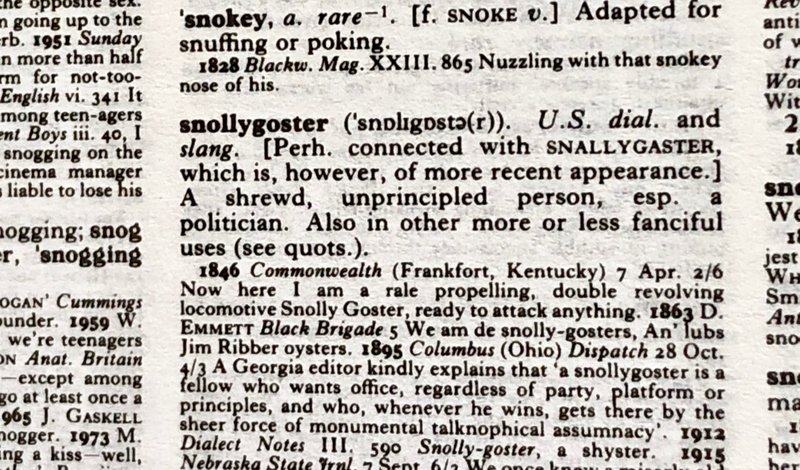When you tinker with a recipe and get it just right, you are eager to cook it for your family and friends. When you get new furniture, you invite people over to show how comfortable or cool it is.
But when you're cleaning out the junk closet, and you amass a pile of objects that you haven't touched for several years (maybe the Thighmaster, the Shoe Umbrellas, the Goldfish Walker?), you're less likely to want to show others what you plan to scrap.
Dictionary editors go through similar processes. When they make room in smaller dictionaries for more modern words, they scrub obsolete, rarely used or outdated words.
The editors typically announce the words they add to each edition, which normally creates some buzz. They're not as inclined to report the words that they've decided to take out.
People don't like to hear about such lost old friends. Supporters may rally for the dictionary to keep the words, either because of nostalgic feelings or just on principle. One Canadian journalist described it this way: "It leaves an odd feeling, a cousin to the nebulous melancholy that accompanies the reading of an obituary of someone you would like to have known."
In 2003, Merriam-Webster chose to excise the word "snollygoster," meaning a smart but unscrupulous person. Meanwhile, some words added to the dictionary that year included "headbanger," "longneck" (for beer, not for giraffes) and "Frankenfood."
Other additions were "comb-over," "macular degeneration" and "heart-healthy."
I can see why people wanted to hold on to snollygoster. It's cooler. The decision caused some people to try harder to use the word, and in the ensuing decade it showed up in a number of political publications.
A couple of years earlier, the word "chad" had been heading closer to the lexicographer's junk pile. It had simply fallen out of use. But then the 2000 presidential election happened, and hanging chads caused the start of a long ballot recount.
Here are a few words removed from Merriam-Webster's Collegiate Dictionary or the Collins Dictionary in recent years:
Alienism
This is the study and treatment of mental illness. I think that term needed deletion.
Brabble
A person brabbling argues stubbornly about trivial matters. I'm sure this word could still have a busy life today.
Cyclogiro
This is an aircraft that flies because of its rotating blades.
Deliciate
When you deliciate, you indulge in feasting. I'm going to use that word starting today.
Frigorific
A frigorific thing causes or creates cold. The polar vortex is like that.
Frutescent
An adjective for resembling a shrub.
Hodad
A person who doesn't surf but hangs out with surfers and pretends to be one.
Nephoscope
The nephoscope is a device used to gauge the direction and speed of clouds.
Vitamin G
Riboflavin is the compound formerly known as vitamin G.
Wittol
A man who tolerates his wife's cheating on him is a wittol. Interestingly, the word has not been used very often since the 1940s.
The policy of the hardy Oxford English Dictionary is never to remove words from its print pages. It gives the definition and history of each entry. Any word that has become obsolete is marked with a teeny, tiny dagger. The practice helps to explain why the OED's second edition comes in at 21,730 pages in 20 volumes.
But even that fact has a footnote. A 2012 history of the OED reported that Robert Burchfield, a former editor of the OED who died in 2004, secretly deleted thousands of words because they had foreign origins.
If all the words with foreign origins were deleted, the OED would be a slim pamphlet.
Here are some words Burchfield chose to dump:
Balisaur: A badger-like beast from India
Calabazilla: A wild squash from Mexico.
Danchi: A Bengali shrub.
The people at OED are investigating the matter.
For a few years, a website -- SaveTheWords.org -- allowed people to adopt obsolete words. You could become the parent or guardian, for example, of "oncethmus" (the loud cry of a donkey), if you vowed to use the word in conversation as much as possible.
Unfortunately, the site is obsolete.
Of course, the words taken from Merriam-Webster and other dictionaries don't truly disappear. Even words omitted from the print version are likely to live on in the online version. We have a diligent thing called the Internet to help us with that.
And good news: Many of the omitted words still can be used in Scrabble.
Sources: Babble.com, Dictionary.com, The Atlantic, Boston Globe, CBS News, Tech Times, The Guardian, MentalFloss.com
bkwordmonger@gmail.com
Style on 01/28/2019
